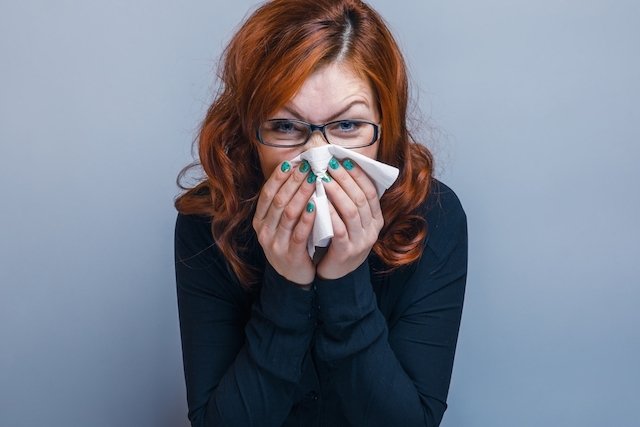Cough and runny nose are common symptoms of allergies and typical winter illnesses, such as colds and flu. When it is caused by allergic reasons, an antihistamine is the most appropriate medicine for immediate treatment for relief, but to make sure that it is an allergic condition, other symptoms should be observed, such as sneezing, itching in the nose or throat and sometimes eye symptoms such as itching, watery, red eyes.
Cough and runny nose medicines should be used with some caution, as when used inappropriately they can worsen the situation and lead to more serious illnesses, such as pneumonia, for example. Therefore, you must carefully observe whether the cough is dry or whether it produces any phlegm. Even if there is not much phlegm, the use of antitussives is not the most recommended, as this type of medication will block the cough that is necessary to remove this phlegm and lead to its accumulation in the lungs.
Therefore, it is best to always consult a doctor before using any medicine, even over-the-counter, as, if used incorrectly, they can cause various types of complications.
The most commonly used remedies and syrups vary according to the type of cough:
1. Dry cough medicine
In the case of a dry cough without other symptoms or if it is only accompanied by sneezing and a runny nose, it is likely to be an allergic reaction and, in this case, the person can take an antihistamine, such as cetirizine, and wash the nose with seawater or saline to relieve symptoms.
However, the medicine should only be used by adults and if it has previously been recommended by a doctor. In addition, you should consult your doctor again if, after 3 days, your cough has not improved. Check out more about the remedies recommended for dry cough.
2. Medicines for coughing with phlegm
In the case of coughing with phlegm, it is recommended to take medications that help facilitate expectoration and reduce the symptoms presented. Reinforcing hydration, that is, drinking lots of water or tea, helps to thin and loosen sputum.
Some cold and flu remedies may be helpful. In cases where the phlegm is very persistent, has a greenish color, or if there is fever or associated pain, it is important to go to the doctor as there may be a bacterial infection that may need to be treated with an antibiotic, such as Amoxicillin. Check out more details about the treatment of cough with phlegm.
3. Cough syrups
Cough and runny nose syrups should only be used under medical supervision after evaluating the symptoms, but a good example is Vick syrup. In the case of coughing with phlegm and runny nose, the ideal is to strengthen the body’s natural defenses, increasing the consumption of foods rich in vitamin C, such as orange, acerola and pineapple, or taking 1 tablet of some vitamin C daily, which can be purchased in any pharmacy, even without a prescription.
4. Home remedy for cough and runny nose
Home remedies can help combat coughs and runny noses. One of them is lavender or blueberry tea, which should be prepared at the rate of 1 teaspoon for every cup of boiled water.
Some useful tips in case of a cough and runny nose are: protect yourself from the cold by wearing suitable clothing, eat well and don’t forget to drink plenty of water to keep your body hydrated. This can even improve coughing by thinning the secretion, making it easier to expectorate.
Bibliography
- COUGHLIN, Laura. Cough: Diagnosis and Management. Am Fam Physician. 75. 4; 567-575, 2007
- MORICE, Alyn H.; et al. ERS guidelines on the diagnosis and treatment of chronic cough in adults and children. Eur Respir J. 55(1). 1901136; 1-31, 2020
- LAMAS, Adelaida; DE VALBUENA, Marta Ruiz; MÁIZ, Luis. Cough in children. Arch Bronconeumol. 50. 7; 294-300, 2014
- GIBSON, Peter G. Management of Cough. J Allergy Clin Immunol Pract. 7. 6; 1724-1729, 2019

Sign up for our newsletter and stay up to date with exclusive news
that can transform your routine!
Warning: Undefined array key "title" in /home/storelat/public_html/wp-content/plugins/link-whisper-premium/templates/frontend/related-posts.php on line 12
Warning: Undefined array key "title_tag" in /home/storelat/public_html/wp-content/plugins/link-whisper-premium/templates/frontend/related-posts.php on line 13




